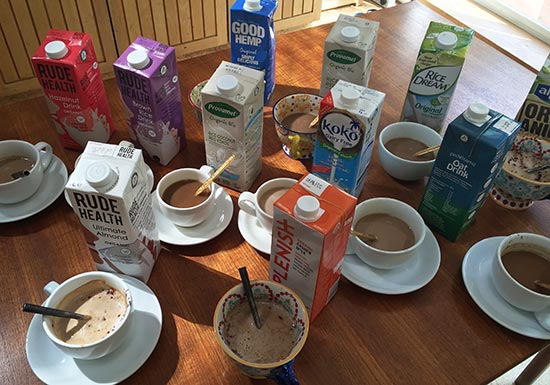|
|
|
Alternative milk coffee sampling |
Cressida checks out how well some of the many alternative milks on the market work in that all important cappuccino... |
The UK spent an extra £53.5 million on dairy alternatives last year, with coconut and nut milk sales increasing by 43% to almost equal those of soya milk (Kantar Worldpanel). So it is timely that we also managed to try every single dairy-free alternative to cow’s milk (excepting quinoa, macadamia and tiger nut milks) in coffee, using a proper barista’s coffee machine! It’s something we should have done years ago, but to be fair we may not have had such a wide range at our disposal: there would not have been rice, coconut, rice-coconut, hemp, hazelnut, almond, soya, cashew, and oat. The results of two hours of frothing and brewing are all below, but to cut to the chase: Fat: all the dairy alternatives are fairly low fat. Ranging from rice milks at 1.1g / 100ml through hazelnut at 1.3g, oat milk at 1.5g, soya at 1.9g and hemp or cashew at 2.9g. The coconut milks, which should be very high fat, are in fact all relatively low as they are all heavily diluted. In terms of fortification - a concern for children using alternative milks - only soya milk is currently fortified. And as regards protein, only the nut milks offer a reasonable amount (around 2g/100ml as opposed to cow’s milk’s 3.5g); oat and rice milks have negligible amounts. Why ARE people switching to dairy alternatives? A few reasons – there are many voluntary restricters who choose not to drink cow’s milk for health reasons, or because they do not like intensive dairy farming which includes disrupting the social nature of cows, prophylactic use of antibiotics, pasteurization and homogenisation of milk. Added to this there has been a sharp rise in veganism in the UK (350% increase over the last 10 years, Vegan Society), as more people become aware of the reality of the pain and suffering of animals in the meat and dairy industries, how farming impacts the environment and climate. https://www.vegansociety.com/whats-new/news/find-out-how-many-vegans-are-great-britain Why should people switch to dairy alternatives? In terms of stats, in 2010 the World Allergy Organization estimated that approximately 2 - 5% of all children suffer from cows’ milk protein allergy, to which the EAACI (The European Academy of Allergy and Clinical Immunology) added in 2014 that 6% of the entire European population has cow's milk allergy. In 2014, Zenith International (a food & drink consultancy) estimated that 70-75% of the world’s population is lactose intolerant, while American Medical News Today states: “Levels of lactose intolerance vary between individuals, with an estimated 15% of people of northern European descent, 80% of blacks and Hispanics, and up to 100% of Asians and First Nations people unable to produce lactase.” Fat levels all per 100ml Oatly Foam-able fat 3g: Oatly fat 1.5g: Provitamil Oat Drink fat 1.2g: Koko DF fat 2g: Provamel Organic Bio Rice-Coconut (unsweetened) fat 0.9g: Rude Health Brown Rice Organic Unsweetened (no thickeners) fat 1.4g: Rude Health Hazelnut (2%) drink (Unsweetened) with Rice fat 1.3g: Plenish Organic Cashew (6%) (Unsweetened) fat 2.9g: Rude Health Ultimate Almond (6%) (Unsweetened) fat 3.2g: Good Hemp fat 2.8g: Provamel Organic Bio Rice fat 1.1g: Rice Dream Original Organic fat 1.1g: Alpro Organic Soya fat 1.9g: November 2016 More articles on the management of cow's milk allergy
|













